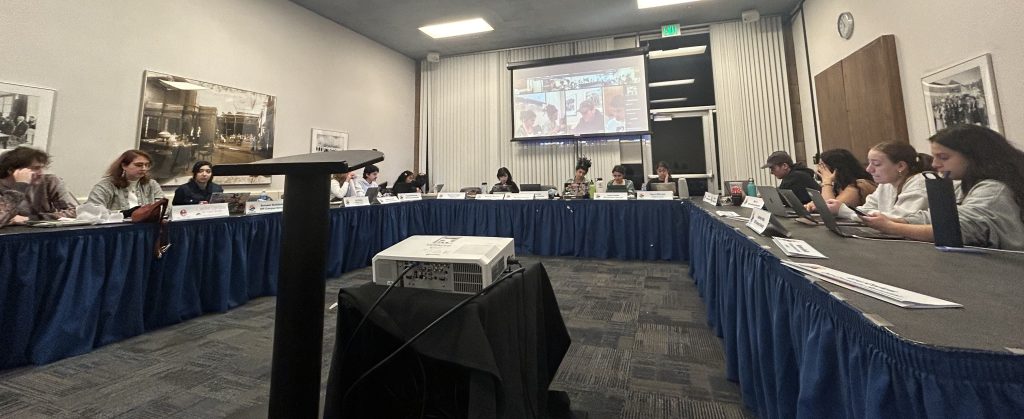AS Senate Recap – 1/29/25
The AS Senate is a group of elected student representatives which serves as the policy-making body of Associated Students. Every Wednesday at 6:30 PM, the AS Senate convenes to pass bills and resolutions, hear reports from Boards, Committees, and Units (BCUs), and hold public forum.
KCSB’s Joyce Chi brings you a recap of their latest meeting on January 29, 2025.
- Keep an eye out for an upcoming special election in Winter Quarter. During this special election, you’ll have the opportunity to vote on the fate of several proposed constitutional amendments, which you can read more about below.
- There are now five new On-Campus Senators, following approval of their appointments. These new Senators are Olabisi Ola-Olaitan, Nadine Malhis, Amna Chaudhry, Kamela Dali, and Ashley Valenzuela Balderrama.
- The Senate held a closed session about “the acquisition of local Isla Vista businesses & properties to expand the Association’s impact on the community.”
- The Senate passed the following resolutions, motions, and action items.
-
- A Resolution To Update Article VI of the Associated Students’ Constitution (Siddiqui – Iden – Lala)
- Under this proposal, there would no longer be distinct Senate positions representing residential status (i.e., no more On-Campus, Off-Campus, or University-Owned Housing Senators). Instead, this amendment proposes the introduction of eight “Senators-At-Large,” a position open to all UCSB undergrads. These eight Senators-At-Large would take the place of 18 possible Residential Senators, potentially slimming down the Senate as a whole.
- Senators Enri Lala and Noura Elkhatib both argued that having eight At-Large positions would encourage a greater number of qualified candidates to run and to be creative with their campaigns.
- This proposal also increases the number of Transfer Senators from one to two.
- Some proposed ideas that didn’t make it into the final version:
- Breaking down Senate positions by class year, with the first-year position elected through the Residential Housing Association (RHA).
- Attorney General Eric Carlson argued that by organizing the Senate by class positions, there’d be a set number of students running for each position, which would maximize competition.
- Senator Jasmine Amin proposed having four class level Senators and four At-Large Senators.
- Increasing the Senate’s voting threshold to overturn a presidential veto.
- As it stands, a two-thirds Senate majority is required to overturn a presidential veto of legislation. Because a two-thirds approval is needed for most types of legislation to pass in the first place, the proposal was to increase the veto overturning threshold to a three-fourths majority.
- Breaking down Senate positions by class year, with the first-year position elected through the Residential Housing Association (RHA).
- Under this proposal, there would no longer be distinct Senate positions representing residential status (i.e., no more On-Campus, Off-Campus, or University-Owned Housing Senators). Instead, this amendment proposes the introduction of eight “Senators-At-Large,” a position open to all UCSB undergrads. These eight Senators-At-Large would take the place of 18 possible Residential Senators, potentially slimming down the Senate as a whole.
- A Resolution To Update Article VII of the Associated Students’ Constitution (Siddiqui – Iden)
- This proposed amendment clarifies and adds duties to executive positions within AS. For instance, a new addition allows the AS President to exercise full executive authority” over “personnel decisions for non-elected officers.” The Internal Vice President would now be explicitly responsible for distributing honoraria and “all financial decisions within the Association.” The Student Advocate General would oversee “technological and software initiatives” within AS.
- A Resolution To Update Article X of the Associated Students’ Constitution (Khorsandi – Gerson – Lala)
- Currently, the Constitution requires the Spring General Elections to be completed by the fifth week of Spring Quarter. This proposed constitutional amendment would allow for “reasonable and timely extension[s]” to that Week Five deadline. The extension, which cannot exceed Week Seven, has to be approved by two-thirds of the Senate and the Election Board, following consultation with the AS Executive Director.
- This proposed amendment was raised after concerns that the elections might overlap with religious holidays like Passover or be impacted by natural disasters.
- Some Senators wanted to include language in the amendment that specifies the kinds of circumstances that would warrant an election extension.
- 2024/25 Elections Code Senate Version
- As we previously discussed, Elections Board Chair Caleb Hanson said that one of the biggest changes concerns recall elections. With these new updates, a recall election can be held so long as a recall petition gets enough signatures – i.e., the Senate wouldn’t have to authorize the recall election.
- Last year’s Senate validated a recall petition against then-AS President Tessa Veksler, but ultimately voted to not hold a recall election.
- Chair Hanson also said they’d be letting students decide whether or not to bring back political parties to AS elections. The plan is to include a constitutional amendment on the ballot during the Spring elections.
- As we previously discussed, Elections Board Chair Caleb Hanson said that one of the biggest changes concerns recall elections. With these new updates, a recall election can be held so long as a recall petition gets enough signatures – i.e., the Senate wouldn’t have to authorize the recall election.
- Elections Board Schedule
- This new Spring Elections schedule accounts for Passover, a Jewish holiday. Some Senators expressed concerns that the overlapping of Spring Elections with this holiday dissuaded some Jewish students from running for office.
- A related constitutional amendment is one updating Article X to allow for extensions to the Spring Elections.
- A Resolution Supporting the ASUCSB Bike Committee’s Efforts to Secure ILP-Library Bike Path Construction Funding (Lala – Wahidullah)
- This resolution has three provisions. First, it requests university administration to reach an agreement with the Bike Committee over the funding and timeline for the proposed ILP-Library bike path. Second, the resolution requests two specific university administrators to give the Senate a report after an agreement is reached. Third, it seeks to provide the Bike Committee with all the resources it needs “to meet all bike infrastructure demands around campus” while also simultaneously trying to avoid the introduction of new lock-in fees.
- Senator Eemaan Wahidullah called the ILP-Library bike path a matter of “genuine, urgent importance.”
- A Resolution Implementing the President’s Executive Order 01-21-2025 (Wahidullah – Siddiqui)
- This resolution, spearheaded by Attorney General Eric Carlson, establishes a “Disaster Response Task Force” in accordance with AS President Nayali Broadway’s executive order. This task force is described as the “central element” of the AS’ response and support for students impacted by the LA wildfires. It will help distribute financial, housing, food, and academic support.
- A Bill To Dissolve The A.S. Public Safety Commission & The A.S. Student Initiated Recruitment And Retention Committee (Siddiqui – Singh)
- This bill dissolves two inactive campus organizations in order “to free up their resources and capital [$15,900].”
- A Resolution To Update Article VI of the Associated Students’ Constitution (Siddiqui – Iden – Lala)
- The Senate tabled the following resolution:
-
- A Resolution To Update Article V of the Associated Students’ Constitution (Siddiqui – Iden)
- This resolution introduces a constitutional amendment that would increase the approval threshold for new student fees and for fee reaffirmation.
- The new fees, including fee increases, would have to be approved with a 75% majority; previously, 50%+1 was needed for fees put on the ballot by petition, while 66% was needed for both fee increases and fees put on the ballot by the Senate.
- Reaffirmation, the reapproval of existing fees, would require a 66% majority instead of the current 50%+1.
- Senator Dan Siddiqui said the increased approval thresholds would slow the growth of student fees; in 2023, undergraduates paid over $700 in AS fees.
- Meanwhile, Attorney General Carlson was wary of the proposal. He said that he agreed with cutting the growth of student fees, but not necessarily with cutting back immediately. AG Carlson also expressed concern about the potential impact on BCUs and student workers. “There is a way we can do this while protecting student interests in both ways.”
- This resolution was tabled indefinitely to allow for consultation with campus organizations and to possibly add a section addressing rollover funds.
- Senator Paolo Brinderson said some Boards, Committees, and Units (BCUs) told him they were “scared” by these possible increased thresholds. “The jobs of the BCUs is not to campaign,” he said. “The jobs of the BCUs is to provide their mission statement, to help the student body.”
- Senator Taylor Iden expressed interest in placing a fuller resolution, including a section on rollover created in consultation with Attorney General Carlson, on the Spring ballot.
- According to Senator Siddiqui, this proposed amendment will not be on the winter ballot.
- This resolution introduces a constitutional amendment that would increase the approval threshold for new student fees and for fee reaffirmation.
- A Resolution To Update Article V of the Associated Students’ Constitution (Siddiqui – Iden)
Access this week’s AS Senate agenda (which includes their bills and resolutions) using your student email here. You can see last week’s agenda here. Meetings are typically held each week at the Flying A Room of the University Center (Main Floor) throughout the quarter, aside from Week 10. You can also watch live and past meetings on Facebook here.

